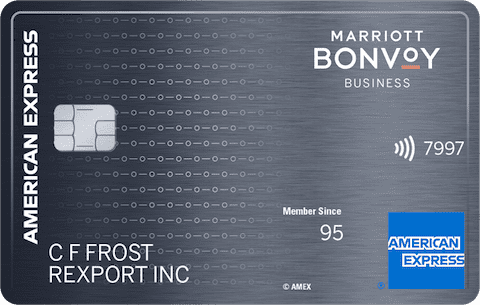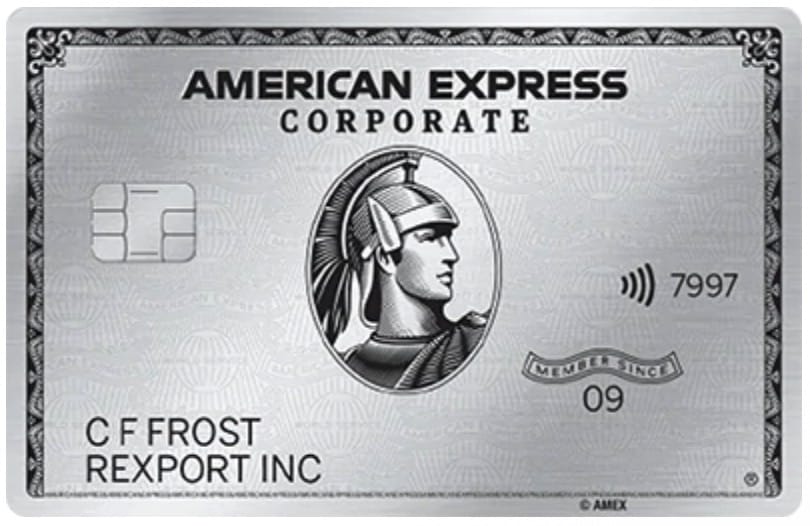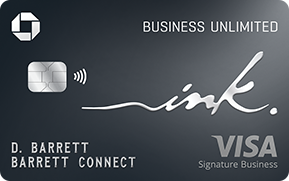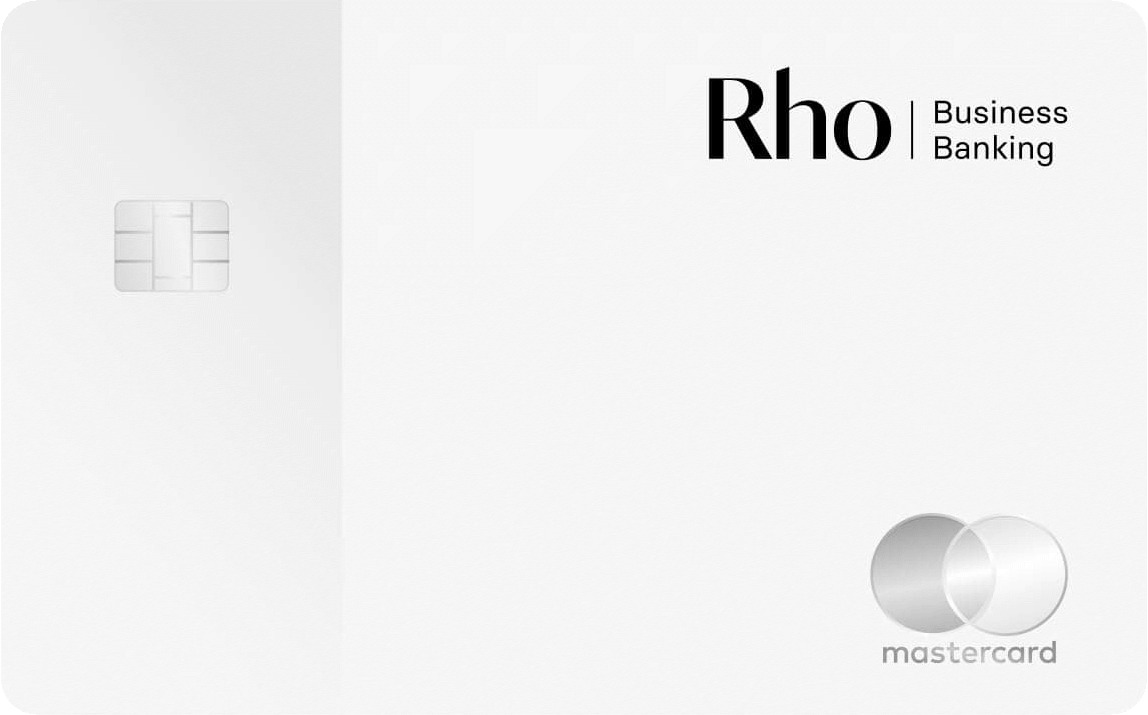Startups are NOT a typical small business, and a funded startup's credit card needs are very different from a traditional SMB. As finance and accounting advisors to hundreds of startups that have raised billions in venture capital funding, we know what to startups should look for in a credit card - and it's not the same as a "traditional" SMB's card.
Our top two recommendations are currently Ramp and Brex - because of their generous spending limits, and the lack of a personal guarantee.


🔗 The Expense Management Tools Arms Race - Brex and Ramp try to out do each other!
What to consider when choosing the best startup credit card
Cash back or Rewards
Traditional small business owners are usually trying to get travel points with their credit card. Venture funded founders have bigger stuff to worry about, and the right credit card will provide rewards that help the startup cut its burn rate. Brex pools all of the company’s points, and these can be used to pay off the card balance (basically, a cash back reward) or to cover other standard startup expenses.
Spending Limit
Run of the mill SMB credit cards companies will typically do a credit check on the founder applying for the card, which means you’ll get a very low credit limit. A fast-growing, funded startup needs a higher spending limit - don’t risk your AWS getting turned off or your trade show exhibit getting rejected because you hit a low limit. Go with a provider that “gets” startups enough to base the limit on your funding!
Personal Guarantee
If you are the founder of a funded business, you should NOT be taking on personal liability for the company’s credit card balance. When a startup is going under, or can’t raise the next round, the founder is already likely liable for the company’s payroll liability. Don’t add on the additional personal liability of the company’s credit card as well. Avoid personal liability by going with Brex.
Easy Bookkeeping
The best startup credit cards make accounting easy. Look for a provider with cleanly presented statements, modern online UX and a search feature. The best online statements update frequently, so you can understand the balance everyday - and once companies get bigger, they usually want to do their books on a weekly basis, so this becomes even more important. Finally, a good card syncs with QuickBooks, Expensify so you don’t have to deal with manual data entry.
Controlled Spending
Headcount grows quickly at funded companies - and they will want to spend money. The best startup credit cards let you limit how much individuals or teams can purchase. You want a provider with an online interface where you can easily adjust spending limits and control your team’s spending. We recommend Brex for this feature.
APR Doesn't Matter
Startups that have raised legit seed and venture funding just pay the bill every month. You don’t want to hold a balance, so this doesn’t matter. If card provider tries to sell you on the importance of APR, they aren’t understand what a startup founder is trying to accomplish. If you are a traditional SMB, then this might be your main source of financing. But for a funded company, the credit card APR doesn’t matter - pay your credit card bill every month, like responsible founder.
The Best Card for Funded Startups - 2025
Right now, in 2025, Ramp and Brex are your best bet if you’ve raised seed or venture funding. Both companies offer generous sign up bonuses through our links, have good expenses management tools, great rewards and solid accounting integrations.
The Best Current Offers for Funded Startups

Ramp offers startups that sign up through Kruze get a $750 cash back offer - this offer ends soon, so visit them now.
We love Ramp’s UX and expense management features, and they have generous cash back rewards, making them a great choice for funded companies looking for a corporate card.

Brex is currently offering companies that sign up through Kruze a 125,000 point sign-up bonus after depositing $500,000 into a Brex business account and an additional 25,000 point sign-up bonus after spending $10,000 on Brex card(s). Sign up now through Kruze.
Brex is the OG startup credit card, the pioneer in offering a card with startup-centric rewards and no personal guarantee for the founders.
One major item to note is that on June 17, 2022 Brex announced that they were no longer serving “SMB” - which in their parlance, means companies that have not raised venture capital funding from professional investors. If that’s you - a startup that is bootstrapped or that hasn’t gone the VC route - you should consider Ramp or Rho. Ramp continues to innovate and add features to their product to help serve SMBs (such as Ramp Flex, which is a bill pay financing product) - so that is a good option for traditional small businesses.
Please note that we have financial partnerships with pretty much all or the companies we mention on this review, whereby our referrals may get special perks and we may be paid when you sign up through one of our links or when you mention us during the sign up process.
Why Startups Need A Specialized Card
Most early-stage companies begin using one of the founder’s credit cards. This may make sense at first, but pretty quickly the types of companies that we work with - ones that raise seed or venture capital funding - outgrow the credit limit (and other features) of someone’s personal card.
If you've raised outside funding, Stop using your personal Card. In fact, Ramp will even work with you prior to raising funding, so check them out.
The #1 reason to get a corporate solution is to remove the personal guarantee from off the founder's credit! Startups fail all the time - don't mess up your personal credit if your startup goes under!
When SVB and First Republic Bank were taken over by the FDIC in early 2023, many startups ended up at non-tech focused commercial banks. Many of these banks try to push small business credit cards onto their startup customers - founders need to be very careful with these cards. Make sure that they do NOT require a personal guarantee by the founder, or, better yet, use an option that we recommend here. And if you are looking for the best bank for your startup, we’ve got you covered.
So how do you choose a better credit card for your funded company?
First, if you are a venture backed (or soon to be VC backed) company, look for cards specifically made for businesses with funding. Most small business cards are going to have features designed to give rewards and benefits to the individual holding the card, not to the company.
Secondly, the credit limit AND the spending are going to be tied to the individual, not the company. This becomes a serious problem when an early-stage, funded company starts putting big ticket items on plastic like server bills, travel or online advertising. You don’t want AWS shutting down because you reached your personal spending limit. And the personal guarantee is not a smart idea - if the company fails, you as the individual will be held responsible for all of the debt.
Regardless of whether or not your company is raising venture funding, you need to get a business credit card - not a personal one. Seperate your personal from your business expenses ASAP!
Features to look for in a credit card for your startup
At the moment, we really like Brex’s rewards - you earn 7x on ride sharing (the average company in our dataset spent approximately $5,500 per year on ridesharing!), 4x on travel and 2x on software like Salesforce. And if you prefer cash-back to your business, go with Ramp, which has 1.5% cash-back.
Choose a plastic provider that “gets” startups enough to base your spending limit on the amount of capital in your bank account. Right now Brex, and soon Stripe’s new offering, will do this.
Avoid personal liability by going with Brex, Ramp or maybe the new Stripe card. American Express has also announced a new “Corporate Card for Startups” - which has stabilized their market share. You can see our comparison of the Amex vs Brex card here, if you are an American Express fan.
This is a place where the tech-forward, startup credit card players shine vs legacy players like Amex. In particular, Ramp’s QBO connection has been solid.
You want the team to spend, because advertising, new equipment, office supplies, etc. are necessary for growth. You want a provider with an online interface where you can easily adjust spending limits and control your team’s spending. We recommend Ramp at the moment, they have moved ahead of Brex’s expense management features. For startups with teams that travel, we currently recommend Ramp and Brex. Both have features to help manage travel spend.
Both companies now have highly rated mobile apps, with Brex currently having 4.9 stars in the iOS store and Ramp with 4.7 stars - great ratings!
The Expense Management Tools Arms Race - Brex and Ramp try to out do each other!
While Brex originally had some decent expense management tools, they upped the ante by launching their “Empower” platform. This combines a number of useful expense features.

Some of the key features include:
- setting a budget for a department, a team, or just an individual
- restricting or capping the expenses possible with particular merchants
- reimburse in non-dollar currencies more easily.
The expense restrictions might be very useful if you have a strong VP of Finance in seat who develops budgets for particular teams or offsite/travel events. And the local currency might be particularly useful if you have hires around the globe, like many of our clients do these days.
One major caveat for these features is that you need to use Brex’s checking account like product to use these expense management tools - Brex Cash. It provides a decent amount of FDIC insurance by networking out the cash to a large number of FDIC insured banks. Read more on our FDIC insurance for startups page. Many of our clients like this, and couple it with a second “backup bank” (i.e. a big bank like JPM, where they can park cash.
However, Ramp has been out-innovating Brex in the expense management category for the past year or so. We’ve noticed that their tools are reaching the point where larger, later-stage companies are forgoing switching to a full “enterprise” expense management system and are sticking with the tools bundled with Ramp’s cards. This makes Ramp a serious contender for any founder who knows that they will rapidly be scaling the team and provisioning cards for many employees. Ramp is ideal if your startup will have a large, enterprise sales team that will need expense policies and easy-to-use expense management software.
When Should You Get a Corporate Credit Card?
The short answer is immediately! You should really get a corporate credit card as soon as you fund your bank account. When you set up your business the first couple of steps go as follows:
- Incorporating the company.
- Receiving the EIN letter or number from the IRS.
- Setting up a bank account.
- Funding that bank account with checks from your friends, family, and/or investors.
As soon as you have done that, you should get a corporate credit card.
Why have a corporate credit card?
There are a number of very good reasons why you should get a corporate credit card:
When you’re putting expenses on the corporate credit card, your brain tends to treat the money differently. It would feel wrong to buy yourself a new wardrobe or other personal items with the corporate card, and so the temptation to commit fraud is taken away. We recommend having one for this reason alone.
Your accounting firm is going to go through the credit card and bank account statements at a later date and put all of that information into your online accounting system, such as QuickBooks. By paying for everything with your corporate credit card, founders don’t have to go back and track down any rogue transactions in their personal accounts that should be charged to the business, which makes life so much easier for accountants.”
If you put expenses on your personal credit card to be reimbursed later, you need to file an expense report in order to have receipts. This is really important because you need to create a paper trail for the IRS and, sometimes, investors will also want to see the paper trail too, if they are big expenses.
Hunting through old statements and filing personal expense reports is a lot of effort. A corporate credit card will make things so much cleaner and easier as well as most likely saving you a lot of time and money, as it allows your accountant to go through all the expenses quickly and from one account.
Kruze, a leader in startup accounting, breaks down the best startup credit cards.
We only work with funded, early-stage companies, so we know what your accounting systems and credit cards need to be capable of to support rapid growth. Many founders struggle with tools designed for consumers or massive enterprises - finding just right product or service for an early-stage company can be hard.
Thankfully, we’ve taken our experience working with hundreds of funded companies and summarized it for you here. And if your startup needs professional finance and accounting help, reach out to us!
Good credit cards for funded startups
Ramp
Ramp combines a corporate card with expense management tools like expense report creation and analysis, personal reimbursement and expense policy creation. Ramp is strongest for Series A to Series C companies who are dealing with the rapid increase in the number of people paying for software, travel, etc. Their new bill pay feature is getting traction and positive reviews from Kruze clients. Ramp is the leading alternative to Brex for VC-backed companies, and we highly recommend their offering to fast-growth companies.
Ramp offers startups that sign up through Kruze get a $750 cash back offer - this offer ends soon, so visit them now.
We love Ramp’s UX and expense management features, and they have generous cash back rewards, making them a great choice for funded companies looking for a corporate card.
Ramp Feature Ratings
Ramp Pros & Cons
Ramp Pros
-
Great expense management controls
-
1.5% cash back on all purchases
-
Manager spending control tools
-
Integrates with QuickBooks Online, Xero, and more
-
No personal guarantee
-
Excellent travel management features for teams
Ramp Cons
- No cash/checking account feature
Controller
Ramp is easy to use, and the sync works well with QuickBooks Online. Startups are very happy with it.
Senior Accountant
Lots of policy features/virtual cards for specific spending.
Controller
Syncing transactions into QuickBooks Online, reconciling the account, and tracking receipts are all great.
Financial Planning & Analysis
The Ramp card gives the founders good control over their team's spending.
Accounting Manager
In my opinion, the Ramp card is a good choice because it offers great spend control, easy accounting and doesn't require a personal guarantee.
Onboarding Manager
Ramp's interface is very intuitive and easy to navigate. Their QBO integration is also great and saves us a lot of time as all that is required on our end is to sync the transactions for the month, review their auto categorizations, and reconcile the account. Ramp also allows you to set rules for vendors, so if their auto categorization isn't picking up on a specific nuance about a vendor, you can set a rule to map to the correct account.
Brex
Brex is the OG best card for a funded startup. Brex has an amazing rewards program for funded companies - you company earns points for all of the company’s spending, and these points are big for typical startup expenses like ridesharing (7x points), travel (4x points) and more. Plus, Brex gets funded businesses enough to base the spending limit on a company’s funding, and doesn’t require the founder to take on a personal guarantee. Brex has innovated by adding a saving-like cash account, bill pay, and excellent expense management features.
Brex is currently offering companies that sign up through Kruze a 125,000 point sign-up bonus after depositing $500,000 into a Brex business account and an additional 25,000 point sign-up bonus after spending $10,000 on Brex card(s). Sign up now through Kruze.
Brex is the OG startup credit card, the pioneer in offering a card with startup-centric rewards and no personal guarantee for the founders.
Brex Feature Ratings
Brex Pros & Cons
Brex Pros
-
Awesome rewards
-
Discounts on AWS and other common expenses
-
High spending limits
-
Good accounting integrations
-
No personal guarantee
-
100,000 Points Brex Sign-Up Bonus through Kruze for $6,000 Spend
Brex Cons
- More like a charge card
- Not for traditional SMBs
Account Manager
Clients seem to really like this card. It’s fantastic and easy to use.
Account Manager
Brex is easy to use and integrates with Kruze systems well.
Senior Manager
A pro of Brex is that it is built for startups based on their business metrics (KPIs). Because of this, Brex has been given to startups that did not qualify for other credit cards.
MCP/BPO Director
Brex is great for startups who have raised a lot of capital. Could have a better syncing feature for quickbooks.
Financial Planning & Analysis
Brex is one of the best cards for a funded startup - Pros include no personal guarantee, good rewards, and it makes accounting easy.
Senior Accountant
Pros of the Brex card include - seamless accounting integration and customizable statements.
Amex Bonvoy
Marriott Bonvoy Business American Express Card is designed for small businesses, and is used by a measurable number of our funded CEOs for their startups. It offers very strong rewards for spending at Marriott hotels - 6x reward points. Plus, it gets the founder elite status at Marriott hotels, which could be very important for the founder of a B2B company who is always on the road closing sales. Founders likely use this card because they like to stay at Marriotts, and want to get the travel rewards for their family to use on vacation. It is possible to sync the Amex Bonvoy with QuickBooks and Expensify, so bookkeeping is easier and faster. Founders who choose the Amex Bonvoy are going to be taking on personal liability for the card, and are going to encounter a frustratingly low credit limit for a high-growth, funded company (because the limit is based on the founder’s credit score).
Amex Bonvoy Feature Ratings
Amex Bonvoy Pros & Cons
Amex Bonvoy Pros
-
Good travel rewards
-
Familiar brand
-
QuickBooks and Expensify syncs
Amex Bonvoy Cons
- Low spending limit based on founder’s credit history
- Personal liability
- Not a great card for startups
Sr. Acccountant
I really love this card because it has great rewards in the format of Marriott points. We're able to subsidize our vacation a little bit each year. So the card works great and rewards are great. The negatives would be it has a personal guarantee on it, unlock other startup credit cards. Also, accountants can have trouble with access on the Amex portal and connecting it to QuickBooks Online. It's a recurring problem with American Express credit cards.
Financial Planning & Analysis
Like the Chase cards, The Amex Bonvoy card is a small business card. It is not for funded startups. Another con is that it makes the founder take on a personal guarantee.
Accounting Manager
The Amex Bonvoy card offers good points and decent receipt management.
Stripe Card
Stripe's corporate card is available to companies already using the Stripe platform. In particular, if your early-stage company is already using Stripe, they can use your history as a basis for your limit. Plus the you'll get 2% cash back on the categories your company uses most each month - and that's automatically calculated, so you always get the best deal.
Stripe Card Feature Ratings
Stripe Card Pros & Cons
Stripe Card Pros
-
Great for companies using Stripe already
-
1% cash back, plus 2% cash back on the top two categories for each month
-
AWS, Hubspot and other discounts
-
No founder’s personal guarantee
Stripe Card Cons
- While startups aren’t required to have a Stripe account, it’s primarily designed for startups that heavily utilize Stripe's services
Financial Planning & Analysis
The Stripe card is a good choice for companies already using Stripe, although the UX is still a bit weak.
Controller
I feel as though Stripe's online integration with QBO could be better.
Expensify
Expensify recently came out with a new offering that ties neatly with their existing corporate expense management software/service. It makes it easier to set up spending limits, get approvals and ensure spending compliance, and collet receipts. It's a no-fee product. Since many Expensify users already configure daily payments, the card balance can be configured to be paid off on a daily basis. We don't think the founder needs to carry a personal guarantee, but it's not 100% clear.
Expensify Feature Ratings
Expensify Pros & Cons
Expensify Pros
-
Integrates neatly with Expensify’s existing spend and receipt management tools
-
Spending limits, approvals and more
-
Discounts on popular tools like Carta, Gusto and AWS
-
Cardholders receive 1% cash back on every purchase made with the card, with no minimum spending requirements, which increases to 2% if they spend more than $250,000 in a month
Expensify Cons
- No points
Financial Planning & Analysis
The Expensify card has a pretty good online interface and expense management features, but the rewards are not as strong as some of the others cards.
Senior Accountant
In my experience, the Expensify card is not user friendly. I, therefore, wouldn't recommend it to startup founders.
Senior Accountant
Transactions sync with QBO, but they don't make sense with multiple Balance Sheet accounts. Call support and online help aren't the best, compared to that of other cards.
Controller
The Expensify card offers a pretty good integration with a number of accounting and HR software tools. Also, I think that the Expensify website is pretty easy to navigate.
Accounting Manager
The Expensify card is not my first choice for startups. It lacks traditional credit card statements and the reconciliation is not intuitive. This therefore complicates the accounting system integrations.
Amex - Corp Card for Startups
American Express has finally responded to the market share loss being taken by Brex and the other new startup-focused credit cards. The new Corporate Program for Startups by Amex takes some of the best features of Brex and combines them with some of American Express’ best rewards. The Corporate Program for Startups by Amex has no personal liability, protecting the founders, plus provides flexible rewards that can accrue to the company or to the employees. It’s only available through invitation - ask your Kruze account manager for an introduction.
Amex - Corp Card for Startups Feature Ratings
Amex - Corp Card for Startups Pros & Cons
Amex - Corp Card for Startups Pros
-
No personal guarantee
-
Bank account based spending limit
-
Employee or company can get rewards
-
Airport lounge access
-
Virtual cards
Amex - Corp Card for Startups Cons
- So-so accounting integrations
- Strict eligibility requirements, including revenue and business age
- Travel-focused rewards
Account Manager
Amex limits the number of accounts we can access, so many clients have to provide their statements to us monthly.
Controller
We have a lot of issues accessing client statements, which becomes a bottleneck for us.
Senior Controller
Syncing with QuickBooks Online is great.
Senior Manager
Amex Corporate has a well-known name, but unfortunately, their customer service is not all that great.
MCP/BPO Director
The Amex Corporate Card for Startups offers great benefits and features. However, a con is that AMEX logins can get lost easily and need to be reset quite often
Financial Planning & Analysis
Because there is no personal guarantee, this makes the Amex Corporate Card for Startups a better choice than the regular AMEX cards for a funded startup. Rewards are still pretty SMB focused.
Chase Sapphire
The Chase Sapphire is really a personal credit card, and we are always surprised by the number of startups that use it. Chase Sapphire’s popularity is probably because many founders simply start using their own personal card for their business, and because they want to earn travel points for themselves. It does have some pretty generous rewards for the founder, with the Sapphire Preferred giving 2x points on travel and restaurants, and 1 point for each $1 spent on other categories. However, it’s not really business tool, and a Chase Sapphire card is going to rely on the founder for the credit limit (so it will be too low for fast growing, funded companies). And the founder takes on the personal guarantee. (We are only including the Chase Preferred in this list because we see so many founders use it for business purposes - Chase does have a better business card, the Chase Ink.)
Chase Sapphire Feature Ratings
Chase Sapphire Pros & Cons
Chase Sapphire Pros
-
Good travel rewards
-
Lots of people already have it
-
Low annual fee of $95
Chase Sapphire Cons
- Not a business card
- Low spending limit based on founder’s credit history
- Personal liability
- Really, not a good credit card for a funded startup
Senior Manager
Chase Sapphire is a great card in general. However, I'd say that Chase has decent customer service.
MCP/BPO Director
Chase Sapphire features great rewards and is easy to use with the books.
Financial Planning & Analysis
The Chase Sapphire card is a small business focused card and is not for funded startups. A con is that it makes the CEO take on a personal guarantee.
Controller
Chase Sapphire's online integration with QBO could be better.
Controller
Very messy and busy website.
Head of Quality Assurance and Training
Not a great online platform or support
Chase Ink
Unlike the Chase Sapphire, which is really a consumer card, the Chase Ink line of credit cards is for businesses. Chase offers several versions, including a Chase Ink Business Limited, a Chase Ink Business Cash and Chase Ink Business Preferred. With the Chase Ink cards, early-stage company founders get cash back OR points, depending on the card they pick. The Chase Ink Business Unlimited and Chase Ink Business Cash cards have no annual fee, but there is a low, $95 per year annual fee with the Chase Ink Business Preferred. You also get $500 cash back on the first 2 Chase Ink cards, and the 3rd gives you bonus miles, after you hit the minimum spending amount in the first 3 months.
Chase Ink Feature Ratings
Chase Ink Pros & Cons
Chase Ink Pros
-
Several different cards with different rewards
-
Great rewards, mainly cash back or good points
-
Low or no annual fees
Chase Ink Cons
- Not really built for funded, early-stage companies
- Points accrue to the person, not the company
- Personal liability
Controller
The rewards are great with Chase, but the card isn’t user-friendly. We have trouble accessing the accounts.
Account Manager
This is a good card with good customer service, but we lose online access often.
Controller
Chase has an intuitive interface and QBO integration is generally easy, but we aren’t about to sync receipts with QBO.
Senior Manager
Like the Chase Sapphire, the Chase Ink is a great card in general with decent customer service.
MCP/BPO Director
Chase is easy to use and update the books.
Financial Planning & Analysis
The Chase Ink card is a small business card and it makes the CEO take on a personal guarantee for the card.
Rho
A startup bank with a solid corporate card offering, the Rho card allows funded startups to have access to generous expense limits and attractive, startup-focused, rewards. One major advantage of Rho vs. the competition is that the way they calculate the spending limit is much more stable vs. Brex and Ramp, so startups can have greater predictability into how much they can put on the card.
Rho Feature Ratings
Rho Pros & Cons
Rho Pros
-
Up to 1.75% cash back
-
Option to extend the payback period
-
More stable credit limits
-
No personal guarantee
-
Spending controls and real-time reporting
-
Tightly integrated with Rho’s business banking
Rho Cons
- Need to use Rho's business banking (a good bank, so this is not such a big con)
VP Finance
Rho has been a great banking solution for our fast-growing venture-backed startup. Card set-up is super easy and integrates with Quickbooks for seamless mapping and reporting. The team loves the ease-of-use of the virtuals cards, intuitive dashboards/reporting and impressively responsive customer service.
COO
The efficiency the Rho card offers is significant. For example - we were able to order new physical cards and issue unlimited virtual cards to employees in the space of an afternoon vs weeks with our previous card provider. Not to mention our 3x higher spend limits.
Corporate credit cards are in a technology race over expense management tools

Vanessa Kruze
CEO and Founder of Kruze Consulting
With the launch of the new Stripe Card for business, the Expensify card and the American Express Corporate Card for startups, company credit cards are in the spotlight. Despite this new attention, there’s been a long-raging technology war in the space led by Brex. According to new Kruze Consulting data, Brex has been consistently gaining market share against industry leaders. The reason for this rapid growth is due largely in part to two key factors that Brex has pioneered.
Firstly, Brex figured out how to not force the startup founder to have a personal guarantee against the card’s balance, and figured out how to set a credit limit based on the startup’s funding and performance. Secondly, less talked about but even more compelling to startup CFOs like Kruze, Brex offers amazing expense management tools that make it easy for companies to better understand and optimize how they spend money. In our study of 200 venture-funded startups’ credit card usage, we found that companies’ meals, travel and office expenses dropped, on average, more than $250 a month per employee by switching to Brex! That’s huge savings and it’s due in large part to the technology Brex has built with startup founders in mind. The graph below indicates pretty clearly how this has worked out for Brex recently.
Based on the data, the announcements from Stripe and Expensify make a ton of sense. They’re already tech companies that work with thousands of startups, so it’s not surprising they’d leverage that pipeline for a credit offering. The market share Brex was able to gain against legacy market leaders, no doubt signalled the opportunity for disruption to Stripe and Expensify. Brex won most of that market share using technology tools and their willingness to forgo a personal credit commitment. Undoubtedly confident in their ability to replicate and compete with these tech tools, Stripe and Expensify both have unique approaches to the market. That said, American Express has expressed its willingness to invest in the technologies needed to compete.
Leveraging the significant amount of customers they have on the payments side, Stripe Capital offers loan amounts and repayments based on the holders Stripe transaction activity itself. Taking a lesson from the Brex book, Stripe has enabled account managers to set specific limits and block specific spending categories. There’s also real-time expense reporting through text message and integrations with leading financial software like QuickBooks and Expensify. There’s no doubt that customers who already use Stripe for payments will benefit from having a fully integrated solution like this, but startups collecting payments in other ways may not be able to realize all the benefits of the Stripe Capital card.
Coming full-circle, former credit card company turned expense management software, Expensify, has also created a corporate credit card offering to compete in the vacuum that Brex has opened. Like Brex, the card is free and has no fees, interest, commitments, or personal guarantees. However, unlike both Brex and Stripe, Expensify’s card works in sync with the Expensify platform allowing all transactions to be input automatically - completing expense reports in real-time. Admins even get a daily snapshot of the company’s expenses, so they can keep always stay up to speed. The constant reconciliation between Expensify and other accounting systems is by far the best feature for companies to have a daily picture of their financials. Expensify also boasts exclusive deals with Amazon Web Services, Stripe, Bill.com, Gusto and more.
The incumbents have noticed, announcing “Brex competitors.” The Kruze team has not seen any of these cards in action yet (American Express just announced their card this week) and both Stripe and Expensify have yet to come to officially to market, so it’s unclear how these will perform against the startup competitors. The one thing that’s certain is that this race is being driven by technology, the value of which has Brex clearly demonstrated. As this technological race heats up, services are becoming increasingly more integrated - saving startups time, effort and money. These companies can only expect greater efficiencies and value to be unlocked as some of the most creative minds compete to provide them better and better offerings.
There’s no doubt the competition in the corporate credit card space is heating up to the benefit of startup Founders. At Kruze we work with hundreds of venture-funded startups, so we see a wide array of company needs, dynamics and trends. It’s still early, but so far we are still recommending Brex to a majority of our clients. They’re the proven market leader for startups and the new competitors on the scene, while interesting, have yet to prove themselves in the market. There’s no doubt that Stripe payments users have a great deal to gain from the Stripe Capital card, as do Expensify users with the Expensify card. That said, Brex currently offers extremely good integrations with most digital platforms, so the difference to be seen between the cards has yet to be proven against what Brex has already built.
How the right credit card can make your accounting easier - and why you should care

Scott Orn
Kruze Consulting COO
And as a business owner or founder of a startup, you should really care about making the accounting easy because that saves you a ton of money on your accounting. The easier the accounting is, the less your accountant has to charge. I know this from experience because that’s what we do at Kruze Consulting. So the best credit card is really important because it can get all the data, all the transactional data like vendor, date, payment amount, even transaction description into QuickBooks so much easier. Getting that nice clean bank feed or good credit card feed into QuickBooks saves your accountant a ton of time.
Now especially to us because we have set up and built a bunch of automations that plug into QuickBooks that recognize transactions automatically. So we’re able to do about 70% of the transactions automatically now, which means a human accountant is not touching those transactions, which again saves you a lot of time and money. And we aren’t the only outsourced accounting service to have done this. But we can only do that with some of the credit cards out there because some of them are on super antiquated systems and do not have clean bank feeds and are always needing to be reconnected into QuickBooks. And Brex and Ramp have build in features that make the accounting (and expense management) so much easier - really, get one of these awesome credit cards for startups, don’t go for a SMB focused credit card.
The other important thing for a credit card to make your accountant’s life easier is that they have easy read-only access and log in access in their portal. I can not tell you how many times we have been locked out of American Express. It happens constantly. And if I feel really bad about it, because I have to call and email the founders and say, “Guess what? We’re locked out of American Express again.” And it makes us look stupid, but really it’s American Express or this happens with other credit card portals where we’re getting locked out through no fault of our own. They’re just built on bad technology, really kind of like 1980s, 1990 stuff, and are not built for portal access and multi-tenant access for like companies like us that serve hundreds of startups. They think you have one accountant for one company. That’s how their systems are built. It’s also why we love some of the newer credit card systems.
So we love Brex and now Ramp. They are probably our favorites. Both make the integration with QuickBooks super easy. Our transaction automation runs on top of Brex very nicely. And with the improved automation that Ramp and Brex have built that flows right into QuickBooks, accounting is easier than ever.
And so having a really good credit card that syncs nicely with QuickBooks that plays nicely with our automation, that recognizes transactions and labels them automatically is really important, and has a good portal that can handle accountants who have hundreds of clients and not lock us out constantly. All save you time and money and they save us time and money and it keeps everybody happy.
Best eCommerce Credit Cards

Scott Orn
Kruze Consulting COO
Note: Unfortunately Brex discontinued this offering in mid 2020. Hopefully they will start it again, as it was the best offering for eCommerce companies on the market!
eCommerce companies have some very special requirements. They’re not your usual startup or bootstrapped company. eCommerce companies are buying a ton of inventory on that credit card. They need a high limit. The higher the limit, the more inventory they can buy at one time. That’s helpful to everybody. The other thing they really care about is having a long float, so the best eCommerce credit cards have loooonnngggg float.
Now, float is measured in days. Typically it’s a 30 day float, but sometimes you can get 60 day floats. That’s really helpful because that means you don’t have to pay the balance down in just 30 days; you get an extra month to sell that inventory and get the cash back to pay off the balance. Very, very helpful. Another thing eCommerce companies should care about is having really nice rewards. Unlike many other early-stage companies, eCommerce companies tend to have very high non-personal expenses due to the inventory and online advertising purchases. And so they want to get the rewards that come with that, trips, hotels, airlines, or even cash back. Those can all be very valuable if you’re spending a lot of money on your credit card.
Now, something that’s not as important for an eCommerce company is employee spending limits. Typically, of course, they’re gonna want to have spending limits for some employees. But the vast majority of the credit card spend for an eCommerce company is gonna be on that inventory purchase and some online ad accounts. And so it’s kind of a nice to have instead of a must have. At least that’s our opinion at Kruze Consulting.
So let’s talk about the best credit cards for eCommerce companies. One of the ones we like the most is Brex. And the reason we like Brex is they have a 60 day float for eCommerce companies and their limit is pegged to the total amount of sales the companies do. That range is typically 25 to 50% of sales that are happening in a given month. And the bigger your company and the larger cash balance, obviously the less risky you are, the higher they can go up on that allocation. So an eCommerce company that’s just starting out, not a lot of cash in the bank, they’re probably gonna have a limit. That’s something like 25% of total sales. A big company that’s raised a ton of capital and that looks very safe will be something closer to 50% of sales. That range is actually really important. Brex also has good rewards and it works really well with an accounting system (another reason eCommerce accountants like us love them!) So Brex is a really great credit card for eCommerce companies.
Another one we’ll look at, is Capital One. Now, Capital One it’s not the most fun to work with if you’re an accountant. It’s really hard to get statements, it’s really hard to get integrated into QuickBooks. We don’t know why, it’s a mystery, but it could be a lot better on that front. However, they do have a very generous cash back rewards program. So a lot of eCommerce companies that use Capital One can get up to 2% cash back. Now, just think about that. A typical eCommerce company, it doesn’t have a really high margin. So getting 2% of your total margin back is really, really valuable. Again, it’s not the most fun for us to work with, but those rewards cash back are really, really valuable. However, as we’ve already mentioned, they do put personal liability onto the founder in many cases, so that is a possible deal breaker in our opinion.
Stripe has a really good credit card. Now, Stripes perk is that they give you a rebate on the transaction processing that you’re running through Stripe. So if you’re running revenue or sales through Stripe, you are charged a fee for every credit card and ACH that you run through Stripe. Stripe’s big perk is they actually just rebate you a big percentage of that transaction spend. Now, there’s some limits on that. They only go so high and the rebates only for so long, but it’s a really nice perk, especially if you’re just getting started.
Another credit card to look out for is Amex and Chase, really two credit cards. And I put them together because they’re kind of the old guard and they’re definitely trying to make improvements to their infrastructure. Amex in particular has made some major strides with the American Express Innovators Card, which my team reviews above. Historically, it’s been okay, not great, but Amex and Chase historically had very nice rewards. They partner with a lot of travel, hotel and airline companies. So those are some to look at. Again, there’s other credit cards we prefer more than those, but if you’re really focused on hotel and airline points, then those are the two best ones.
So again, to recap, eCommerce companies have some very special needs. They need a long float, they need a high limit and they really care about the rewards. So we’ve just gone through the best credit cards for eCommerce companies.
Ramp - video feature overviews
Ramp’s customer service
Learn how to sign up for Ramp, and hear about their approach to customer service.
Key features of Ramp - Video overview
Discover the key features of the Ramp platform in this concise video overview.
Is the New Amex Credit Card good for Startups?

Scott Orn
Kruze Consulting COO
Everyone thinks about American Express as a credit card for bigger companies, and they haven’t traditionally focused on startups, but that’s changed. American Express came out with a new corporate program for startups. Card benefits include no personal liability, ease of use, and startup-friendly perks.
This new card will not change your company or your trajectory, but every little dollar helps. Every dollar you save in perks can be redeployed to value-add spend in marketing or engineering.
Benefits of the new American Express Credit Card for Startups:
- American Express has not traditionally focused on startups
- Benefits of new AMEX Card:
- Full Corporate Liability (No Personal Guarantee, security deposit, or credit score impact)
- Easier To Use
- Virtual Cards - allows you to provision employee cards easily
- Global program - not just limited to the United States
- Premium Benefits for Cardholders
- Hilton Honors Silver and Gold Status
- CLEAR Membership
- Uber Rewards
- Trip Delay and Cancellation for flights
- Up to 1.25% Cashback
The new Amex card is a card startups should start paying attention to. Take the cashback benefit along with all the other perks, and you have yourself a winning credit card!
Airbase Review by a CPA Firm

Scott Orn
Kruze Consulting COO
Airbase, a leader in expense management tools for startups, is now offering cash back corporate cards. Find out more.




























